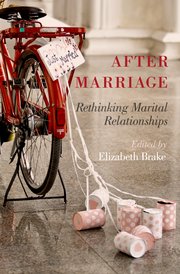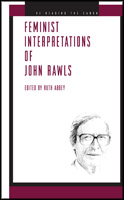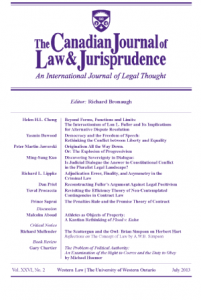all posts on marriage
-
Against Marriage at Aeon
 I have a 3,300 word essay on “Against Marriage” at Aeon magazine. You can read the article here.
I have a 3,300 word essay on “Against Marriage” at Aeon magazine. You can read the article here. -
Against Marriage at APT books
Against Marriage is featured in the New Books By Members section of the US Association for Political Theory. You can see the page here.
-
Against Marriage on BMJ blog
 Richard Smith writes in the British Medical Journal (BMJ) blog that he is persuaded by the arguments of Against Marriage. You can read the full article here.
Richard Smith writes in the British Medical Journal (BMJ) blog that he is persuaded by the arguments of Against Marriage. You can read the full article here.“Chambers is against marriage on the grounds of equality and liberty. Women are not equal with men within marriage, and the state by attaching a bundle of rights and duties to marriage creates a hierarchy of relationships with marriage at the top, making unmarried couples and single people inferior. Much of the population, including my wife and I, thinks that “common law wives” have similar rights to married women, but in fact they have none. By bundling rights and duties together, marriage (and civil partnerships) restrict autonomy; if they weren’t bundled people might choose different combinations of rights and duties.
“There is a need, Chambers accepted, for the law to regulate relationships, particularly to protect the vulnerable, but neither marriage nor civil partnership, which all the speakers criticised as being “one size fits all,” need to be that mechanism. She pointed out that parenthood might be a better basis for regulation than marriage, not least because parent-child relationships are more durable than couple relationships. Tatchell advocates a model whereby people would select “any significant other” (perhaps a best friend, sibling, or lover) and then choose among a menu of rights and duties. Such an arrangement would lead to greater equality and autonomy. All three speakers agreed that something along those lines would be better than either marriage or civil partnerships.
“And at dinner afterwards, my wife and I, despite being married for 40 years, agreed.”
-
The Politics of Marriage at LSE Forum
 Marriage is an odd mix of sex, religion, and politics. Our speakers ask what marriage is and whether there is there any distinctive moral value in it. Should the state promote it? Is it possible to have an ‘equal’ marriage, or is marriage fundamentally an oppressive institution? Should marriage be rejected in favour of civil partnerships, or something else, or perhaps nothing else?
Marriage is an odd mix of sex, religion, and politics. Our speakers ask what marriage is and whether there is there any distinctive moral value in it. Should the state promote it? Is it possible to have an ‘equal’ marriage, or is marriage fundamentally an oppressive institution? Should marriage be rejected in favour of civil partnerships, or something else, or perhaps nothing else?You can watch a video of the event and listen to the podcast here.
Speakers
Clare Chambers
Senior Lecturer in Philosophy, University of CambridgeSir Paul Coleridge
Former high court judge and Chairman, The Marriage FoundationPeter Tatchell
Activist and Director of the Peter Tatchell FoundationChair
Fellow, The Forum
Senior Lecturer in Philosophy, King’s College London -
Blackwells Festival of Philosophy

 I’ll be launching and speaking about Against Marriage at Blackwell’s bookshop, Oxford on 16th November 2017, as part of the Oxford University Press Festival of Philosophy. Register for the event here.
I’ll be launching and speaking about Against Marriage at Blackwell’s bookshop, Oxford on 16th November 2017, as part of the Oxford University Press Festival of Philosophy. Register for the event here. -
Alumni Festival
I am speaking on “Should the State Recognise Marriage?” at the University of Cambridge Alumni Festival on 22nd September 2017. Details are here.
-
Association for Social and Political Philosophy
 I was a keynote speaker for the Annual Conference of the ASPP at the University of Sheffield in June 2017, talking about my book Against Marriage. You can find details of the conference here.
I was a keynote speaker for the Annual Conference of the ASPP at the University of Sheffield in June 2017, talking about my book Against Marriage. You can find details of the conference here. -
Freedom and Autonomy Conference
-
“Time to abandon marriage?” in the TLS
 The Times Literary Supplement (TLS) published my piece “Time to abandon marriage?” as part of their Ethical Angles Series (2017). Read it here.
The Times Literary Supplement (TLS) published my piece “Time to abandon marriage?” as part of their Ethical Angles Series (2017). Read it here. -
Regulating Religious Marriage at CEU
-
Philosophy 24/7
 You can listen to an interview with me on “The State and Marriage” at Philosophy 24/7 here.
You can listen to an interview with me on “The State and Marriage” at Philosophy 24/7 here. -
Philosophers on same-sex marriage at Daily Nous
 I am one of a panel of philosophers discussing the Supreme Court’s ruling on same-sex marriage at the Daily Nous blog. You can read it here.
I am one of a panel of philosophers discussing the Supreme Court’s ruling on same-sex marriage at the Daily Nous blog. You can read it here.On Friday, June 26th, the Supreme Court of the United States announced its ruling in Obergefell v. Hodges, holding that the Fourteenth Amendment of the United States Constitution guarantees the recognition and provision of same-sex marriage. It requires each of the 50 states in the US to issue marriage licenses to same-sex couples seeking them, and to recognize legitimate same-sex marriages performed in other jurisdictions. … The decision is a landmark in the development of the rights and liberties of gay and lesbian people in the US, and is not without its controversy, of course. Many questions have arisen about the reasoning of the majority and that of the dissenting justices, as well as the significance of the decision. To get clearer on some of these issues, [Daily Nous] asked several philosophers to contribute some brief remarks on the ruling. They are: Elizabeth Brake (Arizona State), Cheshire Calhoun (Arizona State), Clare Chambers (Cambridge), John Corvino (Wayne State), Brook Sadler (South Florida), Edward Stein(Cardozo), and Kevin Vallier (Bowling Green).
-
Global Justice: Agency, Power and Policy
 I was delighted to be the keynote speaker at this conference in May 2016, organised by the Centre for Global Ethics at the University of Birmingham. More details of the conference here.
I was delighted to be the keynote speaker at this conference in May 2016, organised by the Centre for Global Ethics at the University of Birmingham. More details of the conference here. -
Alan Milne Memorial Address
 I gave the Alan Milne Memorial Address at Durham University in October 2016. You can find details of that series here.
I gave the Alan Milne Memorial Address at Durham University in October 2016. You can find details of that series here. -
Beyond the nuclear family
 I had a fascinating time presenting at a conference on “Beyond the Nuclear Family” at Umea University in September 2015. More details here.
I had a fascinating time presenting at a conference on “Beyond the Nuclear Family” at Umea University in September 2015. More details here. -
The Limitations of Contract: Regulating Personal Relationships in the Marriage-Free State
 Many theorists defend relationship contracts. Some argue that enforceable relationship contracts should be available alongside existing or reformed state-recognised marriage, and available to either married or unmarried couples. Other theorists argue that relationship contracts are the best sort of legal regulation to replace marriage. It is this latter question that is the subject of this chapter. The chapter contrasts contract and directive models of regulation, and notes that contract appears more compatible with liberty than does directive. However this appearance is illusory since contracts can undermine liberty, directives can enhance liberty, and even a contract regime requires default directives. Moreover, there are various problems with the enforcement of relationship contracts. Specific performance is rarely appropriate in the relationship context. The alternative, fault-based compensatory alimony, risks causing injustice to vulnerable parties such as those who take on caring responsibilities (usually women) and children. Relational contract theory attempts to deal with some of these problems but has its own limitations. The chapter concludes that contract is not the best replacement for marriage.
Many theorists defend relationship contracts. Some argue that enforceable relationship contracts should be available alongside existing or reformed state-recognised marriage, and available to either married or unmarried couples. Other theorists argue that relationship contracts are the best sort of legal regulation to replace marriage. It is this latter question that is the subject of this chapter. The chapter contrasts contract and directive models of regulation, and notes that contract appears more compatible with liberty than does directive. However this appearance is illusory since contracts can undermine liberty, directives can enhance liberty, and even a contract regime requires default directives. Moreover, there are various problems with the enforcement of relationship contracts. Specific performance is rarely appropriate in the relationship context. The alternative, fault-based compensatory alimony, risks causing injustice to vulnerable parties such as those who take on caring responsibilities (usually women) and children. Relational contract theory attempts to deal with some of these problems but has its own limitations. The chapter concludes that contract is not the best replacement for marriage.Reviewers’ comments:
The book is “strenuously avant-garde”. The New York Times (5th April 2016).
Chambers’ chapter is “sobering and refreshing”. Notre Dame Philosophical Reviews (2nd May 2016).
Chambers, “one of the best-known advocates” of the claim that marriage should not be recognised by the state, contributes a “nuanced and lucid” chapter that is “among the most interesting contributions in the volume.” Hypatia (2017)
You can read more about the book here.
- all posts on culture and religion, all posts on feminism, all posts on marriage, all posts on social construction, media, read
3am magazine
 An interview with me, focusing on my work in Sex, Culture, and Justice. Read the interview here.
An interview with me, focusing on my work in Sex, Culture, and Justice. Read the interview here.Clare Chambers chews over the core philosophical issues of sex, culture and justice for liberal feminists, brooding on practices of physical modification, social construction’s role in negotiating claims of universalism and tolerance, Foucault and the panopticon, Bourdieu and habitus, Mackinnon’s critique of liberal feminism, taking violence against women seriously, Benhabib’s discourse ethics, how not to be a relativist, of what kind of universality is worth defending and of the state of academic philosophy and feminism. This is a voice from a war zone. Listen up!
-
The Marriage-Free State
 Proceedings of The Aristotelian Society (2013). This paper sets out the case for abolishing state-recognised marriage and replacing it with piecemeal regulation of personal relationships. It starts by analysing feminist objections to traditional marriage, and argues that the various feminist critiques can best be reconciled and answered by the abolition of state-recognised marriage. The paper then considers the ideal form of state regulation of personal relationships. Contra other recent proposals equality and liberty are not best served by the creation of a new holistic status, such as civil union, or by leaving regulation to private contracts. Instead, the state should develop piecemeal regulations that apply universally. You can read the paper and listen to the podcast here or on the OUP Philosophy Festival Reading List here.
Proceedings of The Aristotelian Society (2013). This paper sets out the case for abolishing state-recognised marriage and replacing it with piecemeal regulation of personal relationships. It starts by analysing feminist objections to traditional marriage, and argues that the various feminist critiques can best be reconciled and answered by the abolition of state-recognised marriage. The paper then considers the ideal form of state regulation of personal relationships. Contra other recent proposals equality and liberty are not best served by the creation of a new holistic status, such as civil union, or by leaving regulation to private contracts. Instead, the state should develop piecemeal regulations that apply universally. You can read the paper and listen to the podcast here or on the OUP Philosophy Festival Reading List here. -
New Directions in Public Reason (2014)
I participated in this excellent event at the University of Birmingham. Details here.
-
Aristotelian Society
 I presented my paper “The Marriage-Free State” to the Aristotelian Society on 7 January 2013. You can listen to the podcast of the presentation here.
I presented my paper “The Marriage-Free State” to the Aristotelian Society on 7 January 2013. You can listen to the podcast of the presentation here. - all posts on feminism, all posts on liberalism, all posts on marriage, chapters, feminism, liberalism, publications on marriage
“The Family as a Basic Institution”: A Feminist Analysis of the Basic Structure as Subject
 in Ruth Abbey (ed.), Feminist Interpretations of Rawls (Penn State Press, 2013).
in Ruth Abbey (ed.), Feminist Interpretations of Rawls (Penn State Press, 2013).In Section 50 of Justice as Fairness: A Restatement, titled “The Family as a Basic Institution”, John Rawls replies to Susan Moller Okin’s feminist critique of A Theory of Justice. The question of how Rawlsian justice might secure gender equality has been discussed by many feminists, most notably by Okin. However, as I argue in this chapter, the Rawls-Okin debate raises more questions than it answers. Okin criticises Rawls for failing to apply his theory adequately to the family: she criticises not Rawls’s approach in general, but his attitude to the family in particular. Okin argues that a consistent application of Rawlsian theory would secure gender justice, but that Rawls is remiss in refusing such consistency. In fact, as I show, Rawls’s remarks on the family reveal a more fundamental problem with Rawlsian theory than Okin allows. It is not that Rawls fails to apply his theory correctly to the family, but rather that the specific case of the family illustrates deep-seated difficulties with Rawlsian justice as a whole.
The problem, to give an outline, is that Rawls’s ambiguous remarks on the family are comprehensible only at the expense of his fundamental claim that there is something distinctive about the application of justice to the basic structure. Okin criticises Rawls for failing to make good on the fact that the family is part of the basic structure. If he did make good, Okin claims, he would see that the principles of justice must apply to the family in a much more extensive way than he actually allows. As I show, however, the family is one illustration of the fact that how the principles of justice apply to an institution does not depend on whether that institution is part of the basic structure. This is a problem for Rawls because the distinctiveness of the basic structure is a crucial part of the political liberalism which, by the end of his work, has become essential to the Rawlsian project.
In this chapter I first outline Okin’s critique of Rawls in more detail, and provide a valid formalisation of her argument against Rawls. I then examine the main premises of her argument and look for evidence to support Okin’s interpretation of Rawls. I conclude that Okin’s interpretation is flawed but nonetheless highlights problems with Rawls’s claim that the basic structure is the subject of justice. I then consider and reject the argument that Rawls’s theory is consistent according to what I call the “whole structure view”: that the principles of justice apply to the basic structure considered as a whole. Finally, I consider G.A. Cohen’s argument that the basic structure distinction is problematic. I agree with Cohen’s criticism of the distinction, but suggest that Cohen is wrong in situating the problem with the issue of coercion. I conclude that Rawls’s position on justice in the family is at odds with his claim that the basic structure is uniquely the subject of justice.
You can see more about the book here.
-
Inclusivity and the constitution of the family
 Canadian Journal of Law and Jurisprudence (2009, 1).
Canadian Journal of Law and Jurisprudence (2009, 1).This article responds to Alan Brudner’s Constitutional Goods. It argues that Brudner’s concept of liberal inclusivity is problematic both conceptually and normatively, and results in policies on marriage and abortion that liberals would not accept. Issue No. 2 includes a response from Brudner.



